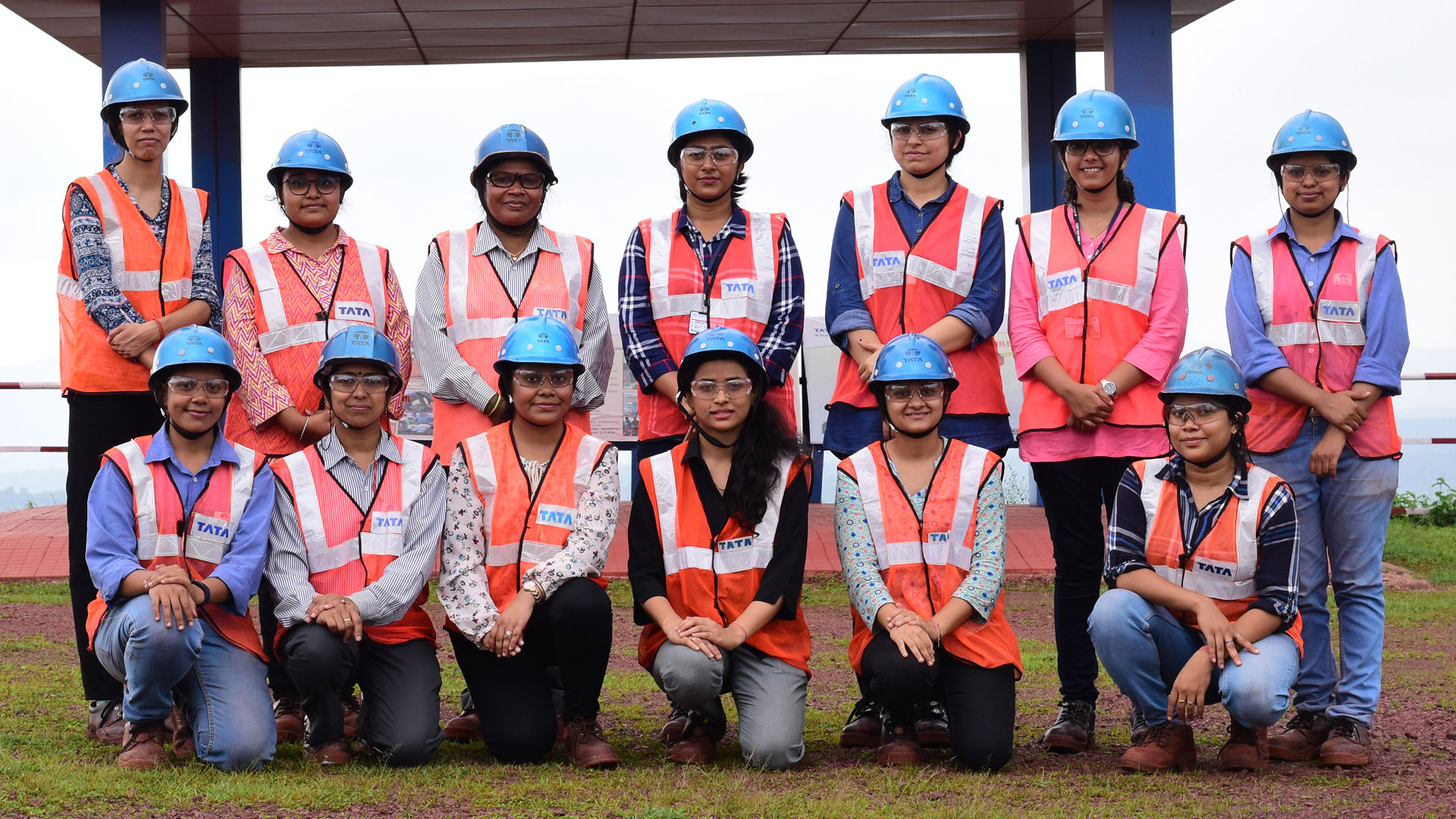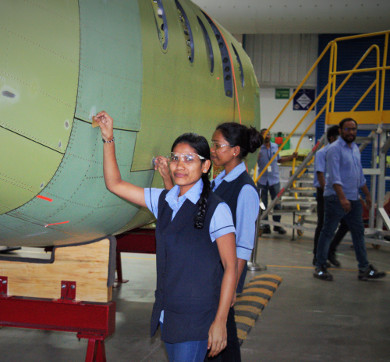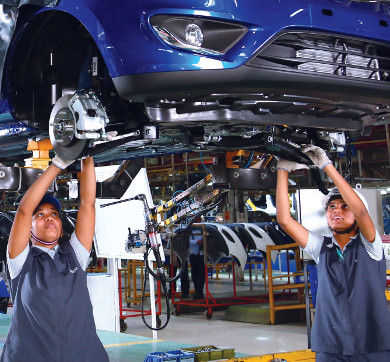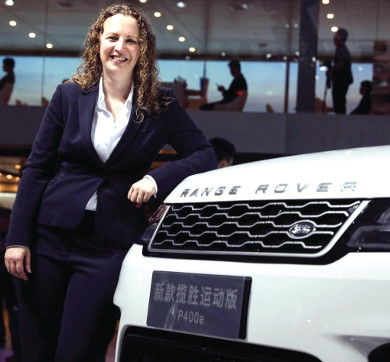March 2020 | 1422 words | 5-minute read
The Noamundi iron mine (NIM), in Jharkhand, is the scene of a quiet revolution. In September 2019, Tata Steel became the first company in India to implement the reforms brought about by the Government of India, allowing women to work on all shifts in mines.
For far too long, women were denied opportunities under the guise of protecting them, kept away from aspiring for anything beyond their reach for their own safety. Often it is the lack of a support structure that gets in the way of women attempting something big. Towards this end, Tata Steel set about putting the support structure in place.
The company has shown that where there is good intention, backed by relevant action, it is possible for women to work on all shifts at its mines. All that is required is for the company to strive to ensure that women have the best environment in which to perform at their optimum capacity.
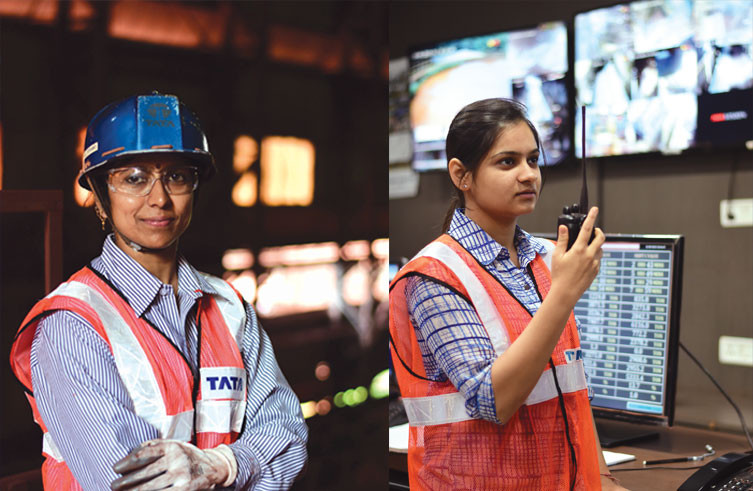
Women of steel
J Liril works as a chargehand general at Tata Steel. She says: "I joined Tata Steel as an apprentice in 2002. In 2006, I was posted at NIM. Since then, I have worked in plant maintenance, and it has been a great learning experience. I have seen the organisation change and evolve over time. When I had joined, I could see hesitation and awkwardness among my male colleagues since I was one of the few women in a male-dominated field. However, over time, I have seen my male colleagues becoming more supportive and comfortable working with a female.
"I wanted to have a holistic experience of working in mines. This new initiative, women@mines, has been very beneficial. Now I get to explore other activities related to the production cycle at mines. I get to learn new things every day at work. The ecosystem has become women friendly, and the opportunities we are getting are tremendous. Every day at work I feel like I am contributing to production.
"What I like about working in shifts is that I am able to spend quality time with my family in the morning! In fact, I can manage my work life and personal life better. My family has always been supportive of my choices and believed in Tata Steel. So, when I told them I would be working on all shifts, they were very supportive."
Karishma Kandoi, a mechanical engineer, says: "I enjoy working as a manager, mechanical, and as a shift in-charge in the Processing and Logistics plant of NIM. The role has given me a platform to showcase my talent and has helped me in my personal growth too.
"As a shift in-charge, I have to monitor data about the plant status while ensuring that the equipment is in good condition. In case of any anomaly, immediate corrective action has to be taken. My primary responsibility is to maximise production. I manage around 30 people during my shift.
"I knew when I decided to make this my career that I would be stepping outside my comfort zone. My parents were initially worried about my decision to work the night shift, but they felt more reassured once I told them about the steps that Tata Steel has taken to ensure our safety. Now they feel positive about my decision.
Atul Bhatnagar, general manager, OMQ (Ore, Mines and Quarries), Tata Steel, is proud of the step taken by the company to make the workplace more inclusive for women. He says, “Tata Steel thrives on a culture of respect, diversity and inclusion. We have been making significant progress in the field of gender equality and are strategising to achieve even more.”
Going beyond the letter of the law
The law does not mandate any specific gender ratio in terms of representation of women at the workplace. Currently, the workforce at Noamundi consists of 9.7 percent women, equaling 111 women employees out of a workforce of 1142.
Towards this end, the company made serious efforts to alter the landscape of its mines and make it more women friendly. Mr Bhatnagar says, “We installed CCTV cameras. Transportation facility has been put in place to pick up and drop all the women in shifts, easing their safety concerns. The bus is equipped with GPS monitoring and CCTV surveillance, with CCTV cameras set up en route as well. SOS and emergency response mechanisms have been set up for quick response.” Additionally, women security guards are provided handheld communication devices that are connected to the security room.
The entire setup was guided by the recommendations of the diversity and inclusion sub-committee and in keeping with the norms stipulated by the Directorate General of Mines Safety. Mr Bhatnagar says, “The entire ecosystem has been developed for making life comfortable and safe for women working in the mines.”
The washrooms and rest shelters were renovated and equipped with better furniture. New washrooms were constructed bearing in mind the comfort, occupational health, safety and security of women.
But the physical infrastructure alone was not enough. Women needed to feel reassured about their workplace. They had to believe that the company cared about their concerns. Mr Bhatnagar says, “We conducted sensitisation sessions with male and female employees.”
Doing things right
A programme of this scope cannot succeed without the buy-in of family members and the community. Knowing this, Tata Steel first discussed its plans with the union. The diversity and inclusion sub-committee, working under the Joint Consultative Council of Management, involved women employees in the decision-making process. Family members too were convinced that the company had the best interests of its women employees at heart.
Earlier, in April 2019, the company had started two shifts at its Jamshedpur plant shop floor for women employees. Learnings from this pilot project helped Tata Steel to fine-tune the programme for Noamundi. Since September 1, 2019, women have been deployed on all three shifts at NIM, OMQ division. Recruitment of female officers in maintenance and mineral processing sections was also done to support this initiative. Trained female emergency response protocol professionals were brought in, and male employees were trained on the intricacies of POSH (prevention of sexual harassment at the workplace). Women officers were appointed to supervise the work.
To support the initiative, the company hired female officers across disciplines, including mining, electrical, mechanical and mineral processing; and in all three categories of employees, namely officers, non-officers and contract employees. Women have also been deployed in the support staff, such as security, canteen staff and sanitation.
Even though the law specifies that there should be no less than three women per shift, Tata Steel deploys at least 10 women per shift.
Progress report
Tata Steel is taking the following concrete steps to achieve its goal of employing 20 percent women in its workforce by 2025.
- Place special focus on hiring women from campuses and through recommendations from experienced female professionals
- Implement ‘Women of Mettle’, a scholarship programme to tap female talent in engineering colleges
- Provide a handbook on recruitment and sensitisation to recruiters and give special incentives to hiring agencies on every successful female hire
- Leverage the media such as Unconscious Bias workshops, Power of Inclusive Management, town hall sessions, joint departmental councils and other creative campaigns to sensitise the workforce
- Introduce policies like work from home, satellite office operation, paternity leave policy, five working days, revised sabbatical leave, extended maternity benefit, nursing break, creche policy, menstrual leave, Take Two policy for women who have taken a career break (Tata group’s SCIP programme) for work-life balance
- Identify and groom high-potential female officers for leadership roles through mentoring programmes and leadership development workshops called Engage and Ignite
- Conduct women empowerment programmes on safety and security, health awareness, etc, through forums like SWATI (Steel Women Aspirational Team Initiatives), EKTA Women@Mining (OMQ division)
The company’s decision to enable, encourage and empower women to work on all shifts is an affirmation of the value of the women’s contribution and their achievements. Mr Bhatnagar says, “Our women employees want to prove to the world that the mining industry is not just for men, and that everybody can work in the mining sector. We hope that these women will inspire many other women to explore career opportunities in the sector.”
The positive effects of this step have already become evident. Mr Bhatnagar says, “Women bring new ideas to the table. They bring in newer perspectives and innovative solutions to problems. Their presence also makes for a more amicable workplace."
—Cynthia Rodrigues
